Young Link (SSBM)
| Young Link in Super Smash Bros. Melee | |
|---|---|
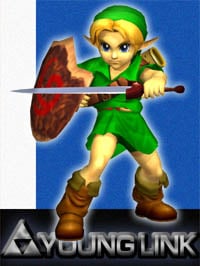 
| |
| Universe | The Legend of Zelda |
| Other playable appearance | in Ultimate |
| Availability | Unlockable |
| Tier | C- (17) (North America) F (18) (Europe) |
Young Link (こどもリンク, Child Link) is a character in Super Smash Bros. Melee. He is a direct clone of Link, with some minor differences. Young Link was replaced with Toon Link in Super Smash Bros. Brawl.
Young Link is voiced by Fujiko Takimoto, who previously voiced him in The Legend of Zelda: Ocarina of Time and its sequel, The Legend of Zelda: Majora's Mask, with her voice clips of the character sampled directly from those two games.
He ranks 17th on the tier list in the C- tier, one place higher than Link. Young Link has a very good approach due to some low lag aerials, a great SHFFL and a good wavedash, as well as three projectiles and good mobility overall. Young Link also is a potent comboer due to his projectiles, and can also edgeguard and space well. However, Young Link's primary flaw is that he has trouble KOing, due to the lack of an efficient quick KO move and having difficulty in hitting cleanly with his smash attacks (except his down smash). Additionally, like Link, Young Link has a slow and predictable recovery, though his ability to wall jump, bomb jump and use his hookshot give him some options. Young Link's recovery, however, is rather poor for his weight class.
How to unlock
For players to unlock Young Link, the Classic or Adventure Mode has to be completed with ten characters.
Alternatively, the player can take part in 500 VS. matches.
When fought, Young Link appears on Great Bay, with Saria's Song playing in the background.
Attributes
As a fighter, Young Link appears as a lighter, weaker, and faster form of Link, and generally falls under the same archetype as a character, similar to characters such as Ness. Other properties of Young Link, however, are almost identical to those of Link. His airspeed and falling speed are identical to Link's, and he has only slightly lower traction, giving Young Link a slightly longer wavedash than Link. Unlike his 16-year-old self, who is a heavyweight, Young Link is a lightweight and gets sent farther and higher (due to having the same fall speed) than Adult Link. Young Link's primary asset is his range. His Kokiri Sword gives him a disjointed hitbox that can allow him to strike from farther ranges, and his neutral, down, and side specials all give him access to a variety of projectiles that can cause damage and start combos from significant distances. Young Link's projectiles are surprisingly damaging, especially in comparison to Link's; his bombs catch opponents in the blast with multiple hits, allowing for combo potential, and both his boomerangs and Fire Arrows inflict more damage and hitstun than Link's, allowing for some dangerous combo starters against his opponents. Coupled with a long-ranged grapple, Young Link's range is among the highest in the game.
Additionally, Young Link has access to a surprisingly good approach game. In addition to his aforementioned range boons, Young Link's aerial approach is very good. Fast, low-lag aerials and a small short hop coupled with a high falling speed gives Young Link an excellent SHFFL, and his high air speed can allow him to easily pursue enemies in the air. These traits also give Young Link a great air game and a surprisingly good edgeguarding game; Young Link's recovery options are great as well, with a relatively high third jump and a wall-grapple to assist him, and the ability to wall-jump.
Young Link's KO options are varied and often different than those found on most other characters. Young Link's neutral aerial and down tilt are quite powerful, with the former having almost nonexistent ending lag when L-canceled. Additionally, Young Link's forward smash has the unusual property of being two hits: one with fixed knockback, and one with powerful vertical knockback, acting as a trap of sorts. One of Young Link's most reliable finishers is his dash attack, which can KO at as low as 95% on some characters, and is unusually fast.
Young Link's primary flaw, however, is his inability to easily and efficiently hit with his finishers. His neutral air requires him to be in the air first, and the remainder of his attacks can prove too awkward to hit with. His dash attack requires the first few frames to connect, and its ending lag can prove to be problematic; that and the inability to send the opponent upwards unless hit at a precise point of the sword and being a semi-spike, which characters (like Fox and Link) can tech out of. With proper use of DI, it's possible to avoid the second hit of Young Link's forward smash. Furthermore, Young Link's down aerial, which can act as one of the most powerful meteor smashes in the game, has a very small and situational sweetspot, significantly hindering its usefulness off the edge. His forward aerial is also among the weakest forward aerials to both combo and finish with and his up smash is weak and not reliable tue to DI, forcing him to over-rely on dash attack or down smash for KOing.
Young Link's light weight makes him considerably easier to KO than other characters; this itself acts as a problem for Young Link due to his poor recovery in comparison to other characters of his weight class (such as Mewtwo or Jigglypuff).
Young Link's Kokiri Sword makes "smacking" sound effects when it connects for every attack except for Young Link's up throw and up special. Young Link's Deku Shield is also slightly less durable than Link's (higher-damage projectiles will phase through the shield).
However, under the hands of a player with skilled precision, Young Link's projectiles, approach options and mobility can prove to be quite deadly.
Differences from Link
Young Link has an ability to wall jump while Link cannot, aiding his recovery. Additionally, Young Link is lighter than Link and also has a much faster dashing speed than Link, but lower traction than him.
Aesthetics
 Young Link wields the Kokiri Sword and Deku Shield instead of the Master Sword and Hylian Shield.
Young Link wields the Kokiri Sword and Deku Shield instead of the Master Sword and Hylian Shield. With the exception of his up special and up throw, all sword attacks make a punch/kick sound effect instead of a slashing sound effect upon impact.
With the exception of his up special and up throw, all sword attacks make a punch/kick sound effect instead of a slashing sound effect upon impact. Young Link's taunt, idle pose, and two of his victory animations are different and longer than Link's.
Young Link's taunt, idle pose, and two of his victory animations are different and longer than Link's.
Attributes
 Young Link is shorter than Link. While this does make him harder to hit, it also results in him having less reach in his attacks.
Young Link is shorter than Link. While this does make him harder to hit, it also results in him having less reach in his attacks. Young Link's Kokiri Sword has less of a disjointed range advantage on his attacks than Link.
Young Link's Kokiri Sword has less of a disjointed range advantage on his attacks than Link. Young Link dashes much faster than Link (1.3 → 1.6).
Young Link dashes much faster than Link (1.3 → 1.6). Young Link has lower traction (0.1 → 0.08) giving him a longer wavedash than Link, but makes him harder to punish out of shield.
Young Link has lower traction (0.1 → 0.08) giving him a longer wavedash than Link, but makes him harder to punish out of shield. Young Link's fast falling speed is much lower (3 → 2.2) making him more susceptible to juggling, and increasing his time airborne for SHFFL attacks.
Young Link's fast falling speed is much lower (3 → 2.2) making him more susceptible to juggling, and increasing his time airborne for SHFFL attacks. Young Link has a slightly higher full hop and double jump than Link
Young Link has a slightly higher full hop and double jump than Link Young Link has a shorter jumpsquat duration than Link (6 → 4), giving him quicker access to aerials, wavedashing, and platform movement.
Young Link has a shorter jumpsquat duration than Link (6 → 4), giving him quicker access to aerials, wavedashing, and platform movement. Young Link is overall weaker than Link in KO potential. Down smash, dash attack, and neutral air KO better than Link's counterparts, but at the cost of lower knockback on all other moves in addition to lacking Link's Spin Attack finisher.
Young Link is overall weaker than Link in KO potential. Down smash, dash attack, and neutral air KO better than Link's counterparts, but at the cost of lower knockback on all other moves in addition to lacking Link's Spin Attack finisher. Young Link's Deku Shield is smaller than the Hylian Shield, projectiles therefore have a slightly lower chance of being blocked by it.
Young Link's Deku Shield is smaller than the Hylian Shield, projectiles therefore have a slightly lower chance of being blocked by it. Unlike Link, Young Link can wall jump, aiding his recovery and ledge play options on stages with walls.
Unlike Link, Young Link can wall jump, aiding his recovery and ledge play options on stages with walls. Young Link's Hookshot is shorter than Link's, significantly reducing its utility as a recovery tool.
Young Link's Hookshot is shorter than Link's, significantly reducing its utility as a recovery tool. Young Link is significantly lighter than Link (104 → 85). While this drastically worsens his endurance for both horizontal and vertical survival, it makes him far less vulnerable to combos than his older counterpart. In particular, it makes him invulnerable to Fox's waveshine combos, as he is knocked down by the shine as opposed to pushed back.
Young Link is significantly lighter than Link (104 → 85). While this drastically worsens his endurance for both horizontal and vertical survival, it makes him far less vulnerable to combos than his older counterpart. In particular, it makes him invulnerable to Fox's waveshine combos, as he is knocked down by the shine as opposed to pushed back.
Ground Attacks
- Neutral attack:
 The second and third hit of neutral attack have less startup lag (frame 7 → 6).
The second and third hit of neutral attack have less startup lag (frame 7 → 6). All hits deal less damage (5% → 3% (hit 1), 3% → 2% (hit 2), 6% → 5% (hit 3)).
All hits deal less damage (5% → 3% (hit 1), 3% → 2% (hit 2), 6% → 5% (hit 3)).
- Forward tilt:
 Forward tilt less startup (frame 16 → 11) and ending lag (FAF 40 → 34), significantly increasing its overall utility.
Forward tilt less startup (frame 16 → 11) and ending lag (FAF 40 → 34), significantly increasing its overall utility. Forward tilt has a shorter duration (frames 16-19 → 11-13) and deals less damage (13%/14%/15%) → 10%/11%/12%).
Forward tilt has a shorter duration (frames 16-19 → 11-13) and deals less damage (13%/14%/15%) → 10%/11%/12%).
- Up tilt:
 Up tilt deals less damage (9% → 8%).
Up tilt deals less damage (9% → 8%).
- Down tilt:
 Down tilt's meteor smash hitbox has a higher priority than the pop up, allowing Young Link to space more easily.
Down tilt's meteor smash hitbox has a higher priority than the pop up, allowing Young Link to space more easily. Down tilt does not deal consistent damage (11% → 7%/9%/10%).
Down tilt does not deal consistent damage (11% → 7%/9%/10%).
- Dash attack:
 Dash attack only has two hitboxes which deal different damage (9%/11%/12% → 10%/11%).
Dash attack only has two hitboxes which deal different damage (9%/11%/12% → 10%/11%). Dash attack sends the opponent away as a kill/edgeguard tool unlike Link's which pops up to combo.
Dash attack sends the opponent away as a kill/edgeguard tool unlike Link's which pops up to combo.
- Forward smash:
 The second hit of forward smash has less ending lag (FAF 50 → 41).
The second hit of forward smash has less ending lag (FAF 50 → 41). Forward smash's first hit has set knockback in order to chain into the second more reliably, however the second hit of the string can be avoided with the use of DI. It also has a shorter duration (frames 15-18 → 15-17) and both hits deal less damage (13%/14% → 10% (hit 1), 18%/20% → 9%/11%/12% (hit 2)).
Forward smash's first hit has set knockback in order to chain into the second more reliably, however the second hit of the string can be avoided with the use of DI. It also has a shorter duration (frames 15-18 → 15-17) and both hits deal less damage (13%/14% → 10% (hit 1), 18%/20% → 9%/11%/12% (hit 2)).
- Up smash:
 Up smash is able to connect against shorter grounded opponents such as Fox and Pikachu owing to Young Link's shorter stature. The third hit also has less startup lag with a longer duration (frames 41-43 → 40-44).
Up smash is able to connect against shorter grounded opponents such as Fox and Pikachu owing to Young Link's shorter stature. The third hit also has less startup lag with a longer duration (frames 41-43 → 40-44). Up smash deals less damage (14% → 11%).
Up smash deals less damage (14% → 11%).
- Down smash:
 The first hit of down smash has a longer duration (frames 9-11 → 9-12).
The first hit of down smash has a longer duration (frames 9-11 → 9-12). The second hit of down smash hits on both sides of Young Link, though it only covers his ankle on the small side.
The second hit of down smash hits on both sides of Young Link, though it only covers his ankle on the small side. Down smash sends opponents sideways instead of upwards, giving it better overall KO ability at the cost of lesser combo potential.
Down smash sends opponents sideways instead of upwards, giving it better overall KO ability at the cost of lesser combo potential. Down smash lacks the stronger sweetspots which deal 16%/17%.
Down smash lacks the stronger sweetspots which deal 16%/17%. Down smash hitboxes are designed in such a way that it is much worse than Link's for shield poking.
Down smash hitboxes are designed in such a way that it is much worse than Link's for shield poking.
Aerial Attacks
- Neutral aerial:
 Neutral aerial is stronger than Link's, and deals the same damage throughout (11%/9%/8% → 12%).
Neutral aerial is stronger than Link's, and deals the same damage throughout (11%/9%/8% → 12%). Neutral aerial is not active in its hitboxes through the duration of the move, unlike Link's.
Neutral aerial is not active in its hitboxes through the duration of the move, unlike Link's.
- Forward aerial:
 Forward aerial has less damage and knockback than Link's version.
Forward aerial has less damage and knockback than Link's version. Young Link's forward aerial is treated as only a single hit unlike Link's which hits twice.
Young Link's forward aerial is treated as only a single hit unlike Link's which hits twice.
- Back aerial:
 Back aerial is easier to connect than Link's.
Back aerial is easier to connect than Link's.
- Down aerial:
 Down aerial has a hitbox on the sword's hilt that inflicts a powerful meteor smash (second strongest in the game by %, strongest by knockback) with a fire effect.
Down aerial has a hitbox on the sword's hilt that inflicts a powerful meteor smash (second strongest in the game by %, strongest by knockback) with a fire effect. Down aerial gets stronger later in the attack, unlike Link's that gets weaker.
Down aerial gets stronger later in the attack, unlike Link's that gets weaker.
- Grab aerial:
 Grab aerial deals 1% less damage and has a shorter range which makes it less safe to use than Link's.
Grab aerial deals 1% less damage and has a shorter range which makes it less safe to use than Link's.
Grabs and Throws
 Young Link's short stature allows him to more easily grab small crouching characters like Jigglypuff, Kirby, or Mr. Game & Watch.
Young Link's short stature allows him to more easily grab small crouching characters like Jigglypuff, Kirby, or Mr. Game & Watch. Young Link's Hookshot grab lasts 3 frames less than Link's, significantly costing him range.
Young Link's Hookshot grab lasts 3 frames less than Link's, significantly costing him range.
Special Moves
- Fire Bow:
 Fire Bow's arrows deal more hitstun than Link's arrows, increasing his combo ability and making the move safer on hit up close. It also has slightly faster startup than Link's Bow.
Fire Bow's arrows deal more hitstun than Link's arrows, increasing his combo ability and making the move safer on hit up close. It also has slightly faster startup than Link's Bow. Fire Bow's arrows deal flame damage (hence the name).
Fire Bow's arrows deal flame damage (hence the name). Fire Bow's arrows travel less distance due to character height, reduced total charge duration, and disappearing 5 frames earlier.
Fire Bow's arrows travel less distance due to character height, reduced total charge duration, and disappearing 5 frames earlier. Fire Bow's arrows have reversed damage roles. It deals more than Bow's arrows uncharged, but less damage fully charged.
Fire Bow's arrows have reversed damage roles. It deals more than Bow's arrows uncharged, but less damage fully charged.
- Boomerang:
 Young Link's boomerang is stronger than Link's on hit.
Young Link's boomerang is stronger than Link's on hit. Boomerang can be angled better to hit close opponents or deflect backwards off the ground.
Boomerang can be angled better to hit close opponents or deflect backwards off the ground. Boomerang's return hitbox deals 1% less damage (3% → 2%).
Boomerang's return hitbox deals 1% less damage (3% → 2%). Boomerang travels less distance compared to Link's.
Boomerang travels less distance compared to Link's.
- Spin Attack:
 Spin Attack lands multiple hits instead of one, allowing it to trap opponents within its hitboxes, and the late hitboxes inflict more damage.
Spin Attack lands multiple hits instead of one, allowing it to trap opponents within its hitboxes, and the late hitboxes inflict more damage. The late hitboxes do not semi-spike and even if all hits connect, it is still weaker than Link's clean Spin Attack in damage. Also, it is not a viable KO move unlike Link's.
The late hitboxes do not semi-spike and even if all hits connect, it is still weaker than Link's clean Spin Attack in damage. Also, it is not a viable KO move unlike Link's.
- Bomb:
 Young Link's bombs look slightly different than Link's, as they are smaller; it has a smaller projectile hitbox but is slightly harder to track visually when thrown.
Young Link's bombs look slightly different than Link's, as they are smaller; it has a smaller projectile hitbox but is slightly harder to track visually when thrown. Young Link's bombs have four hitboxes as opposed to Link's two, increasing their hitstun and combo ability.
Young Link's bombs have four hitboxes as opposed to Link's two, increasing their hitstun and combo ability. Young Link's bombs do more damage to opponents than Link's, given that all of their hitboxes connect.
Young Link's bombs do more damage to opponents than Link's, given that all of their hitboxes connect. The multi-hit property of the bombs means that their explosion can affect Young Link more often in close range.
The multi-hit property of the bombs means that their explosion can affect Young Link more often in close range. Young Link's bombs travel a shorter distance when thrown.
Young Link's bombs travel a shorter distance when thrown.
Moveset
For a gallery of Young Link's hitboxes, see here.
- Young Link is able to wall jump.
| Name | Damage | Description | ||
|---|---|---|---|---|
| Neutral attack | 3% | Same as Link's; two initial slashes, and then it can be either a single launching stab if the A button is pressed just three times, or a barrage of stabs if it's pressed in quick succession. | ||
| 2% | ||||
| 5% | ||||
| 1% (loop) | ||||
| Forward tilt | 12% (tip), 11% (base), 10% (body) | Brings sword down, in an axe-like fashion. Considerably faster than Link's. | ||
| Up tilt | 8% | Swings his sword in an arc above himself. Quick, leads into various air combos if the foe DIs wrong. Above average KO power beyond high damages, usually 120%+, but can KO faster than his up smash. | ||
| Down tilt | 7% (tip), 9% (base), 10% (body) | Swipes sword whilst crouching. Can lead into various combos, though somewhat slow. Incredibly powerful meteor smash if used against a foe on the ledge; unlike Link's, the meteor smash hitbox is located on the tip of the sword, making it considerably more useful for edgeguarding. | ||
| Dash attack | 11% (tip), 10% (body) | Slashes in front of himself and slows down. Surprisingly powerful for a dash attack, and it has the unusual property of Young Link charging forward. With the ability to KO starting at 95%, it is one of Young Link's most used finishers. | ||
| Forward smash | 10% | Swings his sword in front once with low set knockback, and if the A button is pressed again, he will do a much more powerful slash to follow. The first hit easily chains into the second, though it can be DI'd out of. Very strong finisher, damage and knockback-wise. | ||
| 9% (tip), 11% (body), 12% (base & arm) | ||||
| Up smash | 3% (hit 1), 2% (hit 2), 7%-8% (hit 3 clean), 8%-9% (hit 3 late) | Slashes in an upwards arc three consecutive times. Hits all usually follow into each other with the final hit having the most knockback, though DI makes it an unreliable finishing attack. Fully charged is usually the toughest time to get all hits successfully connecting. The last hit has the unusual property of being able to send opponents to the left or right side of him. | ||
| Down smash | 13%/7% (front), 12%/6% (back) | Swings sword on both sides of himself on the ground. First hit comes out fast, though second hit has some lag. Deals less damage if the opponent hits the tip of Young Link's sword. | ||
| Neutral aerial | 12% (clean), 8% (late) | A standard sex kick. Stronger than Link's. | ||
| Forward aerial | 12%/11%/9% (clean), 8%/7%/5% (late) | Swings his sword twice in front of himself. Strangely, even though Young Link does two midair slashes, the move can only hit opponents once. | ||
| Back aerial | 7% (hits 1-2) | Two short-ranged kicks behind himself. More easier for both hits to connect compared to Link's version. | ||
| Up aerial | 15% (clean), 12% (late) | Stabs his sword upwards. Not a good move for KOing, being better at juggling. | ||
| Down aerial | 14%/16% (early), 17%/21% (late), 8%/9% (after bounce) | Very similar to Link's. Thrusts his sword down with massive damage, knockback, ending lag, and duration, and makes Young Link bounce after hitting a foe. If the opponent is positioned above or to the side of Young Link, they will be hit with an extremely powerful meteor smash. This is hard to perform as Young Link will most likely self-destruct. If the opponent is below Young Link, it results in considerable vertical knockback on the first hit, making it a great KO move. It is the strongest meteor smash in Melee (when the 21% hitbox connects) and is the most powerful aerial attack in the game, being even stronger than Ganondorf's down aerial, despite the latter having slightly superior knockback scaling. This is due to Young Link's down aerial having immensely high base knockback (70). Though it is very difficult to meteor smash opponents on a soft platform, it is capable of Star KOing any grounded opponents (only if the characters are on the soft platform) under 150%. | ||
| Grab aerial | Hookshot | 5% | Uses his Hookshot. The attack has the unusual property of not suffering from stale move negation. With low damage, knockback and hitstun, as well as long lag, the move has relatively little use outside of being used for recovery, though its long range can potentially catch opponents off-guard, and it benefits from Young Link's small short hop. This move has transcendent priority. | |
| Grab | Hookshot | — | Uses his hookshot to grab at foes from afar. It's the third longest grab in the game, behind Link. | |
| Pummel | 3% | Hits opponent with the hilt of his sword. | ||
| Forward throw | 3% (hit 1), 3% (throw) | Kicks foe forward. Can chaingrab against heavy foes, or can simply lead into a combo or follow-up attack. | ||
| Back throw | 3% (hit 1), 3% (throw) | Takes foe and kicks them to his back. | ||
| Up throw | 4% (hit 1), 2% (throw) | Takes foe and swings his sword in an arc above, launching the foe above. Can lead into various combos, or simply his up aerial. At high percentage it can lead to his down aerial's meteor smash (up to 200%) if timed correctly. | ||
| Down throw | 2% (hit 1), 4% (throw) | Suddenly grounds the foe and tackles them. This launches the foe temporarily in the air right in front of Young Link, and can lead into many combos, though being DI-able. | ||
| Forward roll Back roll Spot dodge Air dodge |
— | — | ||
| Techs | — | — | ||
| Floor attack (front) Floor getups (front) |
6% | Quickly gets up and slashes on both sides. | ||
| Floor attack (back) Floor getups (back) |
6% | Quickly gets up and slashes on both sides. | ||
| Edge attack (fast) Edge getups (fast) |
8% | Pulls himself up into a front flip and slices downward. | ||
| Edge attack (slow) Edge getups (slow) |
8% | Slowly gets up and quickly thrusts his sword. Similar to Link's, only the sword has a hitbox, meaning that foes close to the edge can avoid the attack completely. | ||
| Neutral special | Fire Bow | 1% (point blank) 8-15% (arrow) | Shoots a flaming arrow that does not travel as far as Link's and does slightly less damage, but has more hitstun. Sticks in shields and the ground, and has its own hurtbox that can be hit by other attacks. Can shoot through opponents or hit twice if stale and used at point blank range. | |
| Side special | Boomerang | 16% (throw), 19.3% (smash throw), 7% (far), 2% (return) | Throws a boomerang forward. Young Link's boomerang doesn't go as far as Link's does, but it deals more damage. The boomerang's distance can be extended or have its trajectory altered with the control stick. The boomerang can be deflected off surfaces, either skidding, or completely changing direction when angled fully down. | |
| Up special | Spin Attack | Ground: 1% (hits 1-12), 3% (hit 13) Air: 3% (hit 1), 2% (hits 2-4), 3% (hit 5) |
Does a spinning attack. When used in the air, it gives Young Link a boost in the air, making it a recovery move. Compared to Link's version, Young Link's Spin Attack has slightly more control when used in midair and hits multiple times on the ground. This move has transcendent priority. | |
| Down special | Bomb | 2-7% (contact), 2% (explosion hits 1-3) | Young Link takes out a bomb and can throw it like any other item. The bomb eventually explodes on its own, even being able to damage Young Link himself. Unlike Link's Bombs, Young Link's bombs deal multiple hits upon exploding. Oddly, anyone who comes in contact with the bomb will have an explosive effect on their bodies, despite the bomb not detonating. The explosion can grant Young Link an extra Spin Attack if used skillfully. | |
Taunt
- Takes out a bottle of Lon Lon Milk, drinks it, and then wipes his mouth. This is the longest taunt in the game.
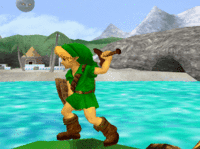
|
Idle poses
- Kicks the toes of his boots on the ground, as if knocking off dirt.
- Looks around himself.
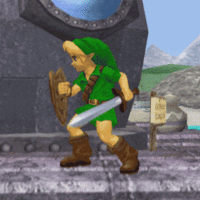 |
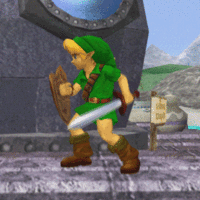
|
|---|
Crowd cheer
| English | Japanese | |
|---|---|---|
| Cheer | File:Young Link Cheer NTSC Melee.ogg | |
| Description | Young-Link! | Young-Link! |
| Pitch | Male | Male |
Victory poses
- B: Checks his belt, then readjusts it. Based on one of his idle animations from The Legend of Zelda: Majora's Mask.
- Y: Puts his sword and shield together and then raises his sword high into the air. Shares this victory pose with Link.
- X: Sheathes his sword, then dusts off his hands and looks at the screen while posing.
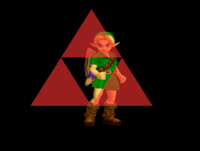 |
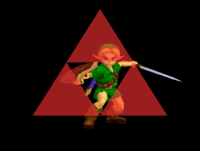 |
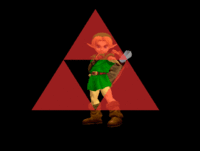
|
|---|
In Competitive play
Most historically significant players
- Any number following the Smasher name indicates placement on the 2019 MPGR, which recognizes the official top 100 players in the world in Super Smash Bros. Melee.
Armada - Currently considered to be the second best behind Axe, but was the best during the Brawl era. He developed Young Link only to fight Jigglypuff, and later dropped him for Fox.
Axe (#4) - Widely considered to be flashiest as well as the best Young Link player in the world. Uses it primarily as a counterpick, but also placed 25th at Smash Camp: End of Summer using only Young Link.
Bambi - A notable Young Link main from the Tristate area who has been ranked on the New Jersey Power Rankings twice. Has taken sets off players such as Qerb, TheSWOOPER, JFlex, and Wally.
Jash - An old-school Young Link player who was considered one of the best in the country during the Golden Age. He moved onto Brawl after it came out, and has since been inactive in the tournament scene.
Kokiri Soldier - Considered to be the second best Young Link player in the United States, behind Axe.
Niklas2912 - The best Young Link player in Europe and considered to be the best solo player with the character. Placed 5th at both Vivaldi Autumn 2019 and Vivaldi Winter 2019, 9th at Vivaldi Spring 2019, 13th at Vivaldi Autumn, and 17th at Valhalla II. Ranked 14th on the Norwegian Power Rankings.
Tier placement and history
Opinions on Young Link in the early metagame were largely pessimistic; he was frequently placed in the mid-low to low tiers, ranking as low as 20th on the seventh tier list. For a long time, he was considered inferior to Link due to his adult counterpart having greater range, better KOing power, and just as good of a recovery. Young Link also suffered from a dearth of good representation at that time, with Jash and Kokiri Soldier (then known as Laijin) as his sole high-level representatives, while adult Link had several notable and influential players such as Aniki, The GERM, and later J666 and Lord HDL pushing his metagame.
Link's perceived superiority continued well into and after the MLG era; however, it was around this time that players began to notice Young Link's potential against floaty characters. His playerbase recognized that he was one of the best Peach answers in the game, due to his ability to defeat defensive Peaches with his speed and projectiles. Even so, high-level players greatly underestimated how significant this advantage was, particularly because they also thought that adult Link was not too far behind in the Peach matchup. This is reflected in the 2010 matchup chart, where both Young Link and Link share a -1 matchup against Peach. They surmised that this seemingly small advantage that Young Link had over Link was not enough to justify placing him higher than Link on the tier list. This still allowed him to rise to just one spot short of Link on the tenth tier list, among other considerations such as Young Link faring slightly better against Sheik.
It would not be until the next year where all preconceived notions of Young Link would be called into serious question, as Armada shocked the world by unveiling his Young Link at several supermajors such as Pound V, GENESIS 2, and most infamously Apex 2012. At these events, he defeated Hungrybox's Jigglypuff decisively in three out of their four encounters, with his only loss being a narrow 2-3. He demonstrated that Young Link was one of the best answers to not only Peach, but other floaties such as Jigglypuff as well, due to his superior movement that allowed for a devastating hit-and-run strategy that adult Link would not be able to replicate. The two would meet again at Apex 2013, where Hungrybox attempted to avoid the matchup entirely by playing Ness for two games, before being forced to switch back after losing those games. The fact that Young Link had the potential to be so oppressive to floaties, that world-class players like Hungrybox would go to such lengths to avoid playing the matchup, finally convinced Melee Back Room panelists that Young Link was a superior meta-call to Link. Reflecting this, he moved above Link for the first time in the eleventh tier list.
Over time, Hungrybox adapted back to Armada's Young Link play, with the latter not enjoying the character enough to push the matchup any further. Nonetheless, Armada and many other top players still acknowledge that Young Link has real, top-level potential against Jigglypuff and other floaties, a sentiment that has since been widely accepted. Modern opinions of Link have declined as well, with many players arguing that his sluggish movement has finally caught up to him in a more optimized metagame, and that many of his advantages in the past came from abusing player error with his more immediate power. Although some players such as Mew2King still consider Link to be slightly better overall due to Young Link's greater struggle against non-floaty characters, the majority consider Young Link's movement and incredible prowess against floaties to overwhelm Link's advantages. He is thus viewed as a fringe yet viable secondary, with Axe being considered the best among them. While Young Link is expected to remain in the mid-low tiers due to his lack of solo viability, he holds a very respected niche in top-level Melee that is still recognized in modern competitive play.
In single-player modes
In Classic Mode
Young Link can appear in ordinary one-on-one matches, in a team as an ally or opponent (paired up with either Link or Zelda), in a giant battle, or as an opponent in the metal fight. In these cases, Young Link either appears on Great Bay or Temple, with the exception of the metal battle. In all such instances, bar the metal fight, Saria's Song will play.
In Adventure Mode
The Adventure Mode makes no concessions to Young Link when he is unlocked.
In All-Star Mode
In All-Star Mode, Young Link and his allies are fought on the stage Jungle Japes, with Saria's Song playing, as the remainder of the Zelda stages are instead taken by Link and Zelda.
In Event Matches
Young Link is featured in the following event matches:
- Event 34: Seven Years: As Young Link, the player fights Link with 3 stock each on the Great Bay stage.
- Event 49: All-Star Match Deluxe: Young Link is the fourth opponent fought in this series of staged battles. The selected character battles him on the Great Bay stage with a stock of 2 while Young Link has 1. With a timer of four minutes, the player must defeat him and the other five characters one-by-one with the overall time and damage: Dr. Mario, Falco, Pichu, Roy and Ganondorf.
Ending images
Trophies
In addition to the normal trophy about Young Link as a character, there are two trophies about him as a fighter that are unlocked by completing the Adventure and All-Star modes on any difficulty with Young Link.
- Young Link
- Link's younger incarnation is often considered to be the true Link: he was a young boy in the very first Legend of Zelda game, and he has appeared as a youth in most of the subsequent games. Since his debut on the original NES in 1987, Link's appearance has changed over and over again, each time adding to the mystique of his incomparable story.
- The Legend of Zelda
7/87
- The Legend of Zelda
- Young Link [SMASH]
- Young Link is lighter and faster than his older self, and his Kokiri sword packs less punch. Even though his Boomerang has a shorter range, he has greater control over it. He's a smaller target, and while his Hookshot has less reach than older Link's, you can still use it in midair as a last ditch attempt to grab a ledge.
- Young Link [SMASH]
- With a youthful spring in his step, Young Link can perform amazing wall-jumps. Once he hits a wall, tap the Control stick in the opposite direction to send him leaping upward; you can practice to your heart's content in Target Test. His Spin Attack can strike multiple times even on the ground, and although it's hard to discern, so do his Bombs.
- Up & B: Spin Attack
Down & B: Bomb
- Up & B: Spin Attack
Alternate costumes

| ||||
Trivia
- Link and Young Link's hookshot use the same model; as a result, it looks larger when Young Link uses it.
- Young Link appears in the background of Link's montage in the introduction to Melee, making him one of the five hidden characters, along with Ganondorf, Jigglypuff, Mewtwo, and Pichu, to have some kind of involvement in the intro.
- Despite the Deku Shield's vulnerability to flames in Ocarina of Time, the Deku Shield is able to block fire projectiles in Melee.
- Because of its length, Young Link's defeat cry does not properly terminate when he is KOed on the left, right, or bottom blast lines; similar behavior occurs with Mr. Game & Watch and Captain Falcon.
- Young Link and Roy are the only fighters to use their KO voice cry for other uses. Young Link's is used during his Star KO animation and Roy's is used when fully charging Flare Blade.
- Young Link, Toon Link and Roy are the only swordfighters in Smash Bros. whose swords consistently produce a punch/kick sound effect instead of a slashing sound effect for the majority of their attacks.
- Young Link and Falco are the only two characters in Melee to have similar images with the same pose for their respective official artworks, alternate costumes, and "Challenger Approaching" screens.
- Young Link is the only character in Melee to not have any even matchups with any character.
- Young Link, Mario, Peach, Yoshi, Link, Kirby, Falco, and Pikachu are the only characters whose portraits on the character select screen match their official artwork.
- Young Link in Melee has the worst fast fall speed increase of any character in any official smash game at only 3.3% faster than his maximum fall speed.
- Despite the entire playable Zelda cast in Melee all being based on their Ocarina of Time designs, Young Link is technically the only one to appear in another game, in this case Majora's Mask.
| Fighters in Super Smash Bros. Melee | |
|---|---|
| Veterans | Captain Falcon · Donkey Kong · Fox · Jigglypuff · Kirby · Link · Luigi · Mario · Ness · Pikachu · Samus · Yoshi |
| Newcomers | Bowser · Dr. Mario · Falco · Ganondorf · Ice Climbers · Marth · Mewtwo · Mr. Game & Watch · Peach · Pichu · Roy · Young Link · Zelda (Sheik) |
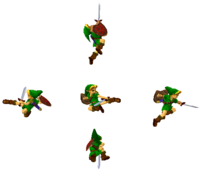




![[SMASH]](https://ssb.wiki.gallery/images/thumb/a/a9/Young_Link_Trophy_%28Smash%29.png/90px-Young_Link_Trophy_%28Smash%29.png)
![[SMASH]](https://ssb.wiki.gallery/images/thumb/d/da/Young_Link_Trophy_2_%28Smash%29.png/94px-Young_Link_Trophy_2_%28Smash%29.png)
